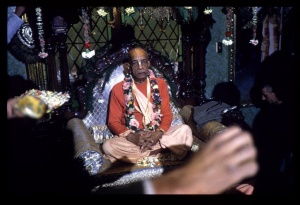SB 3.19.14: Difference between revisions
m (1 revision(s)) |
(Vanibot #0018 edit: make synonym terms in Sanskrit italic in SB - Vanisource) |
||
| Line 1: | Line 1: | ||
{{info | {{info | ||
|speaker=Maitreya | |speaker=Maitreya Ṛṣi | ||
|listener=Vidura | |listener=Vidura | ||
}} | }} | ||
[[Category:Srimad-Bhagavatam - Canto 03 Chapter 19]] | |||
[[Category:Bhagavatam Verses Spoken by Maitreya Rsi - Vanisource|031914]] | |||
<div style="float:left">'''[[Srimad-Bhagavatam]] - [[SB 3|Third Canto]] - [[SB 3.19: The Killing of the Demon Hiranyaksa|Chapter 19: The Killing of the Demon Hiraṇyākṣa]]'''</div> | |||
<div style="float:right">[[File:Go-previous.png|link=SB 3.19.13]] '''[[SB 3.19.13]] - [[SB 3.19.15]]''' [[File:Go-next.png|link=SB 3.19.15]]</div> | |||
{{RandomImage}} | |||
==== TEXT 14 ==== | ==== TEXT 14 ==== | ||
<div | <div class="verse"> | ||
tad ojasā daitya-mahā-bhaṭārpitaṁ | :tad ojasā daitya-mahā-bhaṭārpitaṁ | ||
cakāsad antaḥ-kha udīrṇa-dīdhiti | :cakāsad antaḥ-kha udīrṇa-dīdhiti | ||
cakreṇa ciccheda niśāta-neminā | :cakreṇa ciccheda niśāta-neminā | ||
harir yathā tārkṣya-patatram ujjhitam | :harir yathā tārkṣya-patatram ujjhitam | ||
</div> | </div> | ||
| Line 16: | Line 22: | ||
==== SYNONYMS ==== | ==== SYNONYMS ==== | ||
<div | <div class="synonyms"> | ||
''tat''—that trident; ''ojasā''—with all his strength; ''daitya''—among the demons; ''mahā-bhaṭa''—by the mighty fighter; ''arpitam''—hurled; ''cakāsat''—shining; ''antaḥ-khe''—in the middle of the sky; ''udīrṇa''—increased; ''dīdhiti''—illumination; ''cakreṇa''—by the Sudarśana disc; ''ciccheda''—He cut to pieces; ''niśāta''—sharpened; ''neminā''—rim; ''hariḥ''—Indra; ''yathā''—as; ''tārkṣya''—of Garuḍa; ''patatram''—the wing; ''ujjhitam''—abandoned. | |||
</div> | </div> | ||
| Line 23: | Line 29: | ||
==== TRANSLATION ==== | ==== TRANSLATION ==== | ||
<div | <div class="translation"> | ||
Hurled by the mighty demon with all his strength, the flying trident shone brightly in the sky. The Personality of Godhead, however, tore it to pieces with His discus Sudarśana, which had a sharp-edged rim, even as Indra cut off a wing of Garuḍa. | Hurled by the mighty demon with all his strength, the flying trident shone brightly in the sky. The Personality of Godhead, however, tore it to pieces with His discus Sudarśana, which had a sharp-edged rim, even as Indra cut off a wing of Garuḍa. | ||
</div> | </div> | ||
| Line 30: | Line 36: | ||
==== PURPORT ==== | ==== PURPORT ==== | ||
<div | <div class="purport"> | ||
The context of the reference given herein regarding Garuḍa and Indra is this. Once upon a time, Garuḍa, the carrier of the Lord, snatched away a nectar pot from the hands of the demigods in heaven in order to liberate his mother, Vinatā, from the clutches of his stepmother, Kadrū, the mother of the serpents. On learning of this, Indra, the King of heaven, hurled his thunderbolt against Garuḍa. With a view to respect the infallibility of Indra's weapon, Garuḍa, though otherwise invincible, being the Lord's own mount, dropped one of his wings, which was shattered to pieces by the thunderbolt. The inhabitants of higher planets are so sensible that even in the process of fighting they observe the preliminary rules and regulations of gentleness. In this case, Garuḍa wanted to show respect for Indra; since he knew that Indra's weapon must destroy something, he offered his wing. | The context of the reference given herein regarding Garuḍa and Indra is this. Once upon a time, Garuḍa, the carrier of the Lord, snatched away a nectar pot from the hands of the demigods in heaven in order to liberate his mother, Vinatā, from the clutches of his stepmother, Kadrū, the mother of the serpents. On learning of this, Indra, the King of heaven, hurled his thunderbolt against Garuḍa. With a view to respect the infallibility of Indra's weapon, Garuḍa, though otherwise invincible, being the Lord's own mount, dropped one of his wings, which was shattered to pieces by the thunderbolt. The inhabitants of higher planets are so sensible that even in the process of fighting they observe the preliminary rules and regulations of gentleness. In this case, Garuḍa wanted to show respect for Indra; since he knew that Indra's weapon must destroy something, he offered his wing. | ||
</div> | </div> | ||
__NOTOC__ | |||
<div style="float:right; clear:both;">[[File:Go-previous.png|link=SB 3.19.13]] '''[[SB 3.19.13]] - [[SB 3.19.15]]''' [[File:Go-next.png|link=SB 3.19.15]]</div> | |||
__NOTOC__ | |||
__NOEDITSECTION__ | |||
Revision as of 18:39, 30 November 2017

A.C. Bhaktivedanta Swami Prabhupada
TEXT 14
- tad ojasā daitya-mahā-bhaṭārpitaṁ
- cakāsad antaḥ-kha udīrṇa-dīdhiti
- cakreṇa ciccheda niśāta-neminā
- harir yathā tārkṣya-patatram ujjhitam
SYNONYMS
tat—that trident; ojasā—with all his strength; daitya—among the demons; mahā-bhaṭa—by the mighty fighter; arpitam—hurled; cakāsat—shining; antaḥ-khe—in the middle of the sky; udīrṇa—increased; dīdhiti—illumination; cakreṇa—by the Sudarśana disc; ciccheda—He cut to pieces; niśāta—sharpened; neminā—rim; hariḥ—Indra; yathā—as; tārkṣya—of Garuḍa; patatram—the wing; ujjhitam—abandoned.
TRANSLATION
Hurled by the mighty demon with all his strength, the flying trident shone brightly in the sky. The Personality of Godhead, however, tore it to pieces with His discus Sudarśana, which had a sharp-edged rim, even as Indra cut off a wing of Garuḍa.
PURPORT
The context of the reference given herein regarding Garuḍa and Indra is this. Once upon a time, Garuḍa, the carrier of the Lord, snatched away a nectar pot from the hands of the demigods in heaven in order to liberate his mother, Vinatā, from the clutches of his stepmother, Kadrū, the mother of the serpents. On learning of this, Indra, the King of heaven, hurled his thunderbolt against Garuḍa. With a view to respect the infallibility of Indra's weapon, Garuḍa, though otherwise invincible, being the Lord's own mount, dropped one of his wings, which was shattered to pieces by the thunderbolt. The inhabitants of higher planets are so sensible that even in the process of fighting they observe the preliminary rules and regulations of gentleness. In this case, Garuḍa wanted to show respect for Indra; since he knew that Indra's weapon must destroy something, he offered his wing.